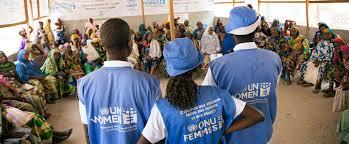
https://www.unwomen.org/en/articles/explainer/humanitarian-funding-cuts-...
A new global report from UN Women reveals a dire warning: half of women-led and women’s rights organizations in humanitarian crisis zones may shut down within six months due to funding cuts. This would have devastating consequences for millions of women and families who depend on their services.
In a global survey conducted by UN Women, 90 per cent of 411 women’s organizations across 44 crisis-affected countries reported being impacted by reductions in foreign aid. More than 60 per cent have already reduced their services, disrupting critical, life-saving support – from emergency health care and gender-based violence services to economic assistance and shelter.
What’s happening to women’s rights funding in humanitarian crises?
The global humanitarian system is under intense pressure. In 2024, USD 44.79 billion was needed to respond to escalating conflicts and disasters – but only 7 per cent of this target has been met. At the same time, major donor governments have announced deep cuts to foreign aid.
While the humanitarian system as a whole is being forced to scale back, local and national women-led organizations are among the hardest hit, despite playing frontline roles in delivering aid and reaching marginalized communities.
Did you know?
Globally women’s rights organizations received less than 1 per cent (USD 142 million) of humanitarian aid funding between 2021 and 2022.
Many of these organizations rely heavily on government donors that are now scaling back. From Myanmar to Palestine, Sudan, and Afghanistan, they deliver vital services and are essential in providing humanitarian services.
Image

UN Women team checks a shipment of humanitarian aid to Palestinian women and children. UN Women Egypt in partnership with the Egyptian Red Crescent delivered desperately needed humanitarian aid to Palestinian women and children in Gaza. Egypt, Ismailia Governorate, January 2024. Photo: UN Women/Menna Negeda.
Why do humanitarian aid cuts hit women and girls hardest?
When women-led and women’s rights organizations are forced to scale back or shut down, women and girls in crisis lose access to essential, life-saving support.
- 62 per cent of surveyed organizations have already reduced services.
- Over 500 women and girls die each day in crisis settings from preventable pregnancy and childbirth complications.
- The majority of service cuts have impacted services to address and stop gender-based violence (67 per cent), followed by health care and livelihoods.
Without women’s rights organizations, survivors of gender-based violence have fewer safe places to turn, and women's health and economic security are increasingly at risk.
Recent country-level data shows just how devastating these funding disruptions are:
- In Afghanistan, 50 per cent organizations reported that programmes for women are directly affected by the funding cuts.
- In Ukraine, 72 per cent of women-led and women’s rights organizations reported severe disruptions to humanitarian and development activities. Critically, over 60 per cent have been forced to suspend or reduce gender-based violence services — leaving survivors without access to safe shelters, legal aid or trauma support. One in three organizations say they may shut down completely within six months if replacement funding is not secured.
Did you know?
Globally, the impacts from the funding cuts are especially severe for the most marginalized: migrants, refugees, LGBTIQ+ individuals, older women, and women with disabilities, whose specific needs may be invisible and they often rely on tailored, rights-based support systems that only local feminist organizations can deliver.
Evidence shows gender-responsive humanitarian programming yields a return of USD 8 for every dollar invested. Yet in 2024, only 1.3 per cent of humanitarian funding addressed gender-based violence.
Why women’s rights organizations are essential in humanitarian response
Women’s organizations are not just service providers — they are trusted leaders and advocates who:
- Reach underserved communities with culturally informed support.
- Provide safe spaces, psychosocial services, and legal assistance for survivors of gender-based violence.
- Ensure that women’s voices are included in humanitarian planning and policy decisions.
- Build long-term resilience by empowering women economically and socially.
When they’re underfunded or forced to close, the entire humanitarian response becomes less effective, less inclusive, and less accountable to those most in need.
Image

In 2020, UN Women in partnership with Oxfam, launched "Means to Lead: Empowering Rohingya Refugee and Host Community Women through Leadership, Learning, and Livelihood" in collaboration with three implementing partners (Mukti Cox's Bazar, Bangladesh Nari Progati Sangha, Rohingya Women Welfare Society). The project aims to empower Rohingya refugee by equipping them with skills, reducing violence against women, and creating self-reliant leadership. Bangladesh, Cox’s Bazar. 2023. Photo: Oxfam/Istiak Karim.
Make an impact!
Support women on the front lines of humanitarian response.
Women’s organizations know the risks and needs of their communities. Supporting them means supporting a faster, fairer, and more effective humanitarian response.
How you can support women’s organizations in crisis
Women-led and women’s rights organizations are working every day to save lives – even as funding shrinks. You can take action today:
- Donate to trusted women’s organizations in crisis-affected areas: UN Women partners with women-led organizations around the world to provide cash assistance, legal and psychosocial support, protect against gender-based violence, support livelihoods, and advocate for women’s rights in emergencies. In 2023 alone, UN Women worked with 1,580 women-led and women’s rights organizations. Donate now.
- Share the facts and amplify their stories: Help raise awareness about the vital work of women’s organizations in crises. Sharing accurate information online helps drive visibility and funding.
- Urge donors and policymakers to act: Major donors and governments can change the future of crisis response by committing to:
- Direct, flexible, multi-year funding for local women-led and women’s rights organizations.
- Representation of women in humanitarian coordination and leadership.
- Equitable partnerships that respect local knowledge and expertise.









